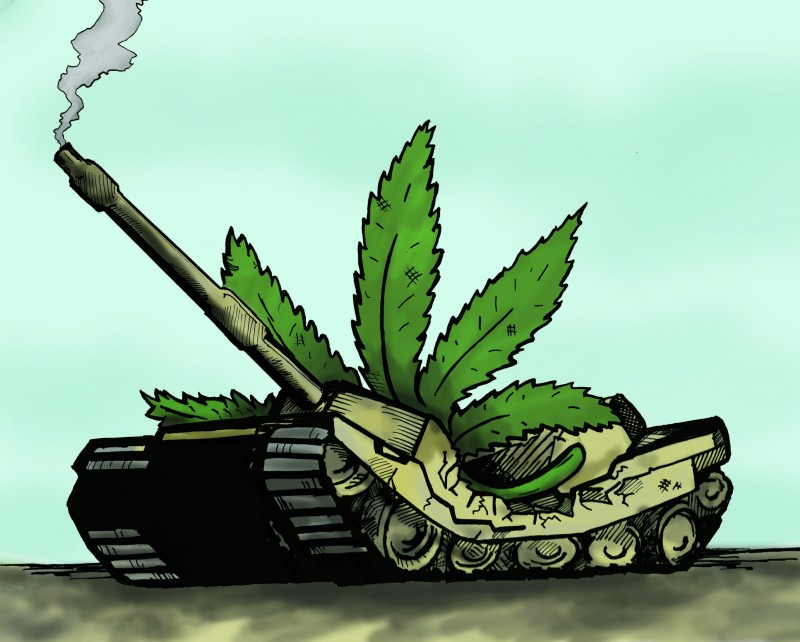The war on drugs is an archaic waste of time and money, and a recent poll conducted by Angus Reid suggests that 68 per cent of Canadians feel this way. There was a time when our neighbours to the south held a much more conservative view on this subject, but the same Angus Reid poll revealed that 66 per cent of Americans also believe that the war on drugs has been a dismal failure, and that 57 per cent of Canadians and 54 per cent of Americans feel that marijuana should be legalized and readily available for sale on the open market.
The states of Colorado and Washington have even gone so far as to vote in favour of this policy, though U.S. federal law will always trump any such vote at the state level, and marijuana will remain officially illegal.
I believe that the war on drugs is the most important issue facing society right now. There is no other issue that touches so many aspects of our lives on such a drastic level. It affects our economy, a broad range of social issues, and our basic freedoms. The UN has estimated that the global narcotics market is worth over US $320 billion a year. This is money that is taken out of the hands of our economy, which could be taxed and spent on drastically improving our social programs, such as support and treatment for addicts, but is instead put directly into the hands of organized crime.
Not only would legalization allow us to invest more money into social programs, it would also be a huge blow to the underground economy that organized crime depends on, and would be absolutely devastating to the criminals who cause such devastation to our society and make such social programs necessary in the first place. Legalization would also free up all the money that many nations are pumping into the war on drugs. For example, the United States spent US $15 billion in 2010 on a futile attempt to eliminate the supply of narcotics, money that could be much more productively spent.
But as much as the war on drugs hurts the public at large, it hurts the users even more. We have made criminals out of a large segment of the population who are otherwise law-abiding citizens. There are prisons filled with people who were suckered into selling drugs and trying to make a quick buck in an underground economy. There are even some in jail whose crime was nothing more than enjoying a vice that was not sanctioned by the government. We have also stigmatized addicts as criminals, making it far less likely that they will seek out the help they need, and have driven them to even lower depths.
Sadly, even though legalization could cripple organized crime and release users from the stigma so that they might step out into the light, there is no end in sight. Despite the fact that there are countless organizations advocating for legalization, some even founded by the very people fighting the war on drugs (such as LEAP or Law Enforcement Against Prohibition), the prospect of legalization, even for a drug as benign as marijuana, is still a long way off.
You see, there are simply too many powerful people and organizations that stand to benefit from narcotics remaining illegal. We’ve all seen the anti-drug advertisements sponsored by the Partnership for a Drug Free America. The hypocrisy here is that the PDFA has received millions of dollars in funding from alcohol, tobacco, and prescription drug companies. Of course, all of these corporate entities have a stake in keeping narcotics illegal because they sell a product that is in direct competition with chemical narcotics, and any new product on the open market could potentially cut into their profits. Their interest is economic, and not for the well-being of the public at large.
Yet in terms of nefariousness, the PDFA pales in comparison to the privatized prison system in the U.S., a system I shudder to think may one day be adopted in Canada when we can no longer economically sustain our swelling prison population. Companies like the GEO group and the Corrections Corporation of America actively lobby the American government to maintain laws that are harsh on drug users and dealers so that there is a steady flow of inmates that they can use for cheap labour. Revenues for private prison corporations annually reach near the two billion dollar mark. When there is this kind of profit to be made, the pressure on the government to keep narcotics illegal and to put drug users in jail for long periods of time is immense.
So for now we will continue to treat otherwise productive members of society as criminals because of their choice of vices. Gangsters will still gun each other down in the street in turf wars and continue to recruit children from low-income families by giving them an easy way to make a quick buck. Hundreds, if not thousands, of police and soldiers will die in Mexico and South America in a hopeless battle with the drug cartels.
Corporations will continue to exploit prison inmates as a cheap source of labour. And liquor, tobacco, and prescription drug companies will continue to rake in record profits every year.
Welcome to our drug free world.



As a member and speaker for Law Enforcement Against Prohibition I find this article to be right on. An excellent piece. We need qall to pitch in and stop the violence related to the control of drugs.